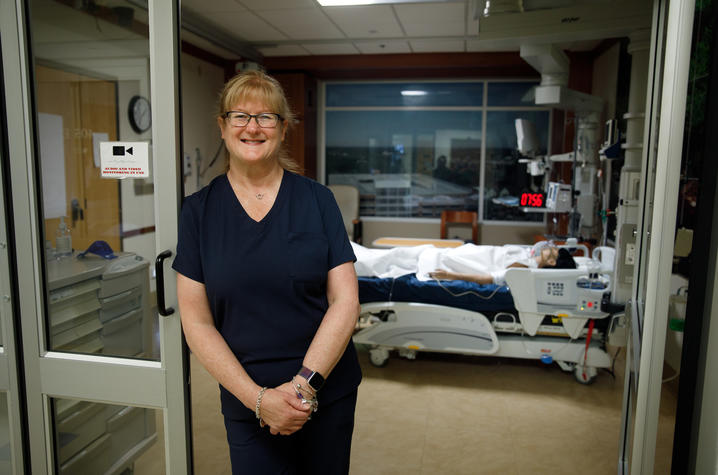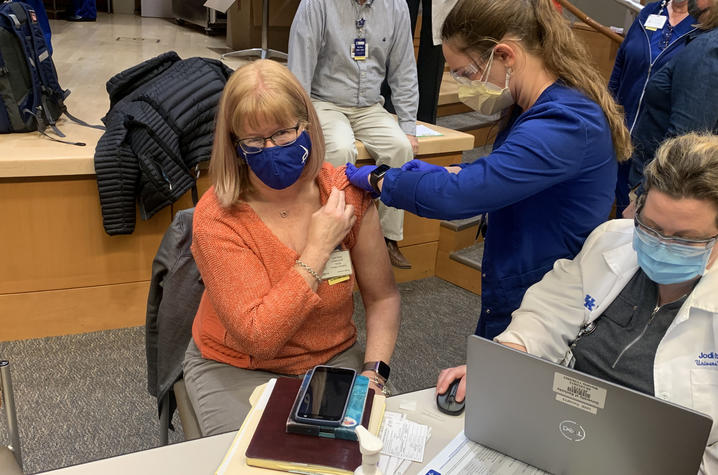'We Became the Patients’ Families' — UK Nurse and Professor Reflects on Pandemic
LEXINGTON, KY. (May 6, 2021) – As the pandemic continues, enough cannot be said about the heroes on the frontlines. Nurses all over the world have gone above and beyond to deliver extraordinary care in the face of a global health crisis while still facing the demands of other professional and personal obligations. As National Nurses Month gets underway, Lynn Kelso, an assistant professor in the University of Kentucky College of Nursing and an acute care nurse practitioner in UK HealthCare’s medical intensive care unit (MICU), reflects on the challenges she and her colleagues faced over the past year.
“It's challenging teaching, working in the hospital and going to school,” said Kelso who is also enrolled as a student in the doctorate program in the College of Nursing. “When I was still working six nights a month in the ICU, that took up three weekends a month. I had to be very organized to keep up with everything that needed to be done; sometimes I was successful at that and sometimes not so much.”
When the COVID-19 pandemic hit Kentucky last year and many UK courses transitioned to an online learning format, Kelso and her fellow instructors had to quickly figure out how to deliver course materials to students without disrupting their carefully planned curriculum. Recording lectures and posting course notes was easy enough, but administering exams and figuring out how to meet students’ needs going forward was more of a challenge.
“Much of the summer of 2020 was spent planning on our safe return in the fall,” said Kelso. “We have undergraduate classes of around 100 students. We have classrooms that can safely sit half of the class while still social distancing so we made plans around that.”
At the hospital, there were different challenges. Kelso and her fellow nurses watched as cases surged in Italy, Spain and New York City while the virus crept closer to Kentucky. Horror stories from those areas abounded with reports of providers contracting the disease and of global shortages of personal protection equipment (PPE). With so much about the virus not yet known, there was little they could do but prepare as best they could.
“A lot of it was the stress of not knowing what to expect,” said Kelso. “PPE was the most important thing to have, along with knowing how to wear it correctly. There was also the planning for how we would handle surging numbers of patients. There were plans for maximizing staff resources as well as bed space. We were prepared and, fortunately, we never had to activate many of those plans.”
At the height of Kentucky’s surge, UK HealthCare was treating about 100 COVID-19 patients in addition to other critically ill and injured patients. One of the most unexpected challenges nurses faced was how to care for patients not just medically, but emotionally. In March 2020, UK HealthCare implemented a strict policy regarding visitors, so nurses found themselves comforting lonely patients.
“Early in the pandemic, when no visitors were allowed, nurses became the patient's family at the bedside,” said Kelso. “No matter how much time the rest of us spend in a room, it's that bedside nurse who is the constant for that patient and without family at the bedside, they had to pick up that role.”
As the pandemic continued, Kelso recalls that nurses adapted quickly to their new normal. The years of training combined with months of preparation led to the formation of new habits and routines, such as having a backpack or fannypack with protective gear that they carry at all times, or making sure to do everything they need to do for a patient in one trip to minimize having to change in and out of PPE.
“The nurses have been fantastic throughout this entire pandemic,” said Kelso. “We prepared for so long, it was basically putting all that preparation to work. We anticipated surges when there were concerning outbreaks around the state, but it was almost like, okay we are prepared for this, we've got this and we will get through it.”
Relief came in December 2020 in the form of a vaccine. Kelso and her colleagues were among the first at UK HealthCare to receive the vaccine and she remembers exactly how she felt when she got it.
“It was a relief,” she said. “It felt like there was now a path to getting back to some normalcy.”
Kelso even found time to volunteer at UK’s vaccine clinic at Kroger Field. The more people who get vaccinated, she said, the sooner we can put the pandemic in the past and get back to making plans. For Kelso, that means rescheduling a trip to Iceland that she was supposed to take last year.
While there is light visible at the end of the pandemic tunnel, Kelso says we’re not there yet. Getting vaccinated, wearing face masks and continuing to social distance, when appropriate, and following the CDC’s guidelines is how we get there. And in honor of Nurses Month, people can honor a nurse by doing just that.
“Nurses are strong, resilient and adaptable to so many situations, but they are not unbreakable and this past year has taken a huge toll in so many ways,” she said. “Everyone wants an end to the pandemic; we don't ever want to go back to where we were a year ago.”
As the state’s flagship, land-grant institution, the University of Kentucky exists to advance the Commonwealth. We do that by preparing the next generation of leaders — placing students at the heart of everything we do — and transforming the lives of Kentuckians through education, research and creative work, service and health care. We pride ourselves on being a catalyst for breakthroughs and a force for healing, a place where ingenuity unfolds. It's all made possible by our people — visionaries, disruptors and pioneers — who make up 200 academic programs, a $476.5 million research and development enterprise and a world-class medical center, all on one campus.






